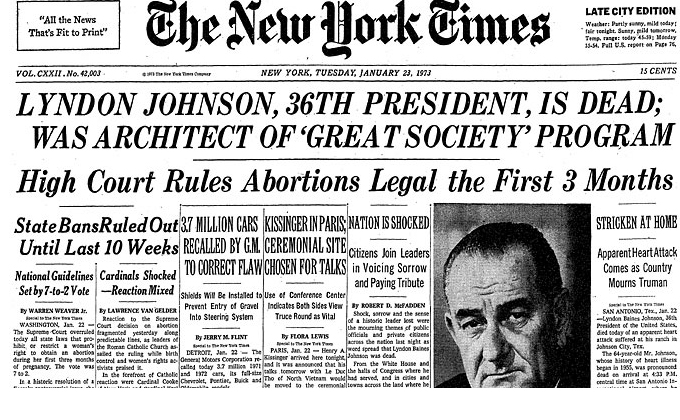From a 1997 Playboy Interview with Sen. Daniel Patrick Moynihan, in which he explains why religious fundamentalism became entrenched in contemporary American politics:
“Playboy: Fundamentalism is a big problem at home and abroad. Are you lobbied by the Christian right?
Moynihan: I will say this to you and if you can print it, do. Once a year the anti-abortion people come to Washington. They are the only people who come to see me. I shouldn’t say “only,” but they are the one group that comes to see me that doesn’t want anything other than to discuss a moral issue it’s concerned with. I might meet three or four other people a year like that, but not many. They’re the only working people I ever see. They come down by bus. They don’t go out to lunch at the mall. They just want to say they have a view of something. I’ve always voted against them.
Playboy: But the Christian right has other issues besides abortion. Some members say every word of the Bible is literally true and they want to impose their views on everyone else. The movement seems pretty important. Do you agree?
Moynihan: It is hugely important. And there’s nothing new about this. At different times in our history there have been very important political movements that were basically religious or concerned with matters of conscience. Abolition was one, out of which came the Republican Party. Prohibition was another. And abortion is a third. Roe vs. Wade just shook the conscience of a large segment of the American population, particularly the fundamentalist Protestants, who were quite content to live a life that didn’t have much politics in it. They didn’t have politics, they had their own religious concerns. Suddenly a matter of true import to them became the law of the land by a decision of the Supreme Court. And they thought, What is this? This has to change. And gradually they became a political force.
Playboy: Do you consider the Christian right dangerous?
Moynihan: No, good God. They’re the nicest people in the world if you leave their consciences alone. And if you don’t, it’s not the first time in history you get resentment. The Catholic Church is just as involved, but the Catholic Church has a wider agenda. In the way we are now using the word, the Catholic social doctrine is liberal. If you’re talking about minimum wage or something like that, they’re with you all the time.
Playboy: Do you feel you have to take the Christian right, creationism and all, into account?
Moynihan: Well, you’d better if you’re thinking to run for president.
Playboy: That makes them sound very powerful.
Moynihan: They are. We may lose our voting rights in the General Assembly because we passed a bill that would pay almost $1 billion in UN dues, but it included a provision that no money will go to any organization that performs abortions. The president has said he will veto the bill over that issue. If you go two years without paying your dues — which may happen if this impasse is not resolved — you can lose your voting rights in the General Assembly.
Playboy: This is bizarre.
Moynihan: Yeah. And it’s a big thing for us to lose our voting rights over something — over what?
Playboy: So a minority can make international policy?
Moynihan: The Southern Baptists aren’t exactly a minority. The Supreme Court is. And if nine people can say that something they find absolutely morally unacceptable is the law of the land, well, that makes people think.”
••••••••••
Moynihan discusses race, 1967:
Tags: Daniel Patrick Moynihan

